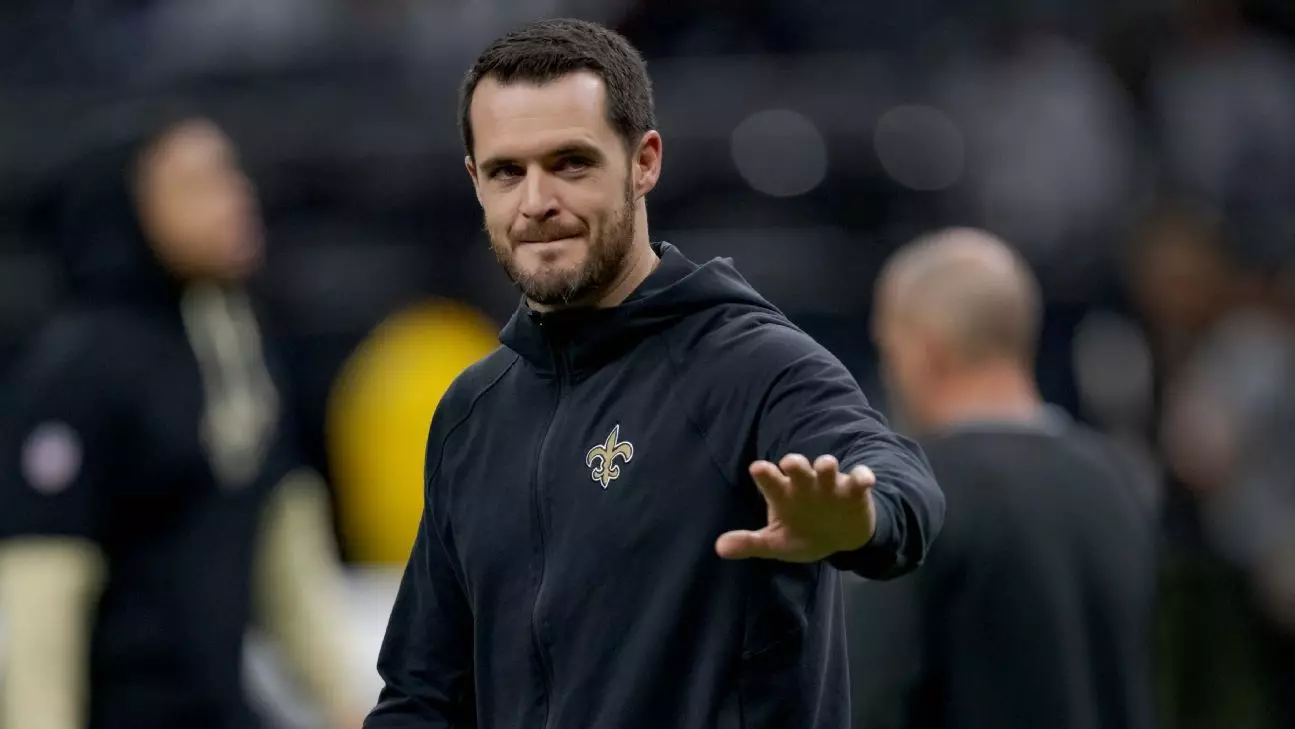In a critical turn of events for the New Orleans Saints, quarterback Derek Carr’s injury has forced him to miss the remainder of the season. Initially sustained during a matchup against the New York Giants on December 8, Carr’s fractured non-throwing hand not only disrupted his personal ambitions but also dashed the hopes of a Saints team striving for playoff contention. As the stakes rose, interim head coach Darren Rizzi remained steadfast, insisting that Carr’s outlook was far from bleak. However, with the announcement of Carr’s absence from the upcoming matchup against the Tampa Bay Buccaneers, the reality of the situation has set in for fans, players, and the coaching staff alike.
Coach Rizzi ardently defended his quarterback throughout the recovery process, expressing frustration over external reports that prematurely signaled the end of Carr’s season. His consistent messaging suggested an unwavering commitment to optimism, emphasizing Carr’s daily dedication to rehabilitation. According to Rizzi, Carr embodied resilience, showing up with determination and a willingness to fight through the injury. “At no point in the rehab process was there ever a ‘I’m done for the year,'” Rizzi asserted, highlighting Carr’s intent to return to the field—particularly for the significant matchup against his former team, the Las Vegas Raiders. This narrative of hope, however, stood at odds with the medical realities and physical limitations that ultimately curtailed Carr’s efforts.
The Saints’ situation presents a complex dilemma. With Carr sidelined, the onus falls on the rest of the team to rally and compensate for the loss of their quarterback. The uncertainty surrounding other key players, such as Alvin Kamara and Chris Olave, further complicates the scenario. Kamara’s recent groin injury has made him doubtful for the next game, while Olave—having dealt with multiple concussions—remains a question mark for the season finale. The combined absence of these star players poses challenges for an already struggling offense that must now reevaluate its strategy for the crucial games ahead.
Throughout the season, Carr’s rehabilitation appeared filled with attempts to get back into game shape, including simulated game scenarios designed to assess his readiness. Despite effortful training sessions—such as injecting his hand with pain medication—Carr was unable to regain the required functionality. Coach Rizzi acknowledged the difficulties encountered: “We already tried once before,” he explained. The continuous setbacks culminated in a gradual realization that Carr would not be able to contribute effectively for the remainder of the season. The emotional toll on both Carr and the coaching staff became palpable as they grappled with the implications of his injury and the end of hope for a playoff run.
As the Saints confront the absence of their starting quarterback, the implications extend beyond the immediate games left on the schedule. This season has tested the depths of the team’s resilience while hinting at a re-evaluation of its roster and strategies moving forward. With ownership and management monitoring the situation closely, the path leading into the next season may require significant adjustments both on the field and within the support staff. The loss of Carr—a veteran player known for his leadership qualities—will also prompt a reshuffling of roles among remaining team members as they adapt to a new dynamic at the season’s close.
Carr’s injury not only symbolizes the fragility of a player’s career but highlights the intricate balance of hope and reality within professional sports. The Saints now stand at a crossroads, seeking to overcome adversity while reflecting on the lessons learned throughout this tumultuous season. As they navigate these waters, the commitment to improvement remains paramount, setting a foundation to build upon in the seasons yet to come.

